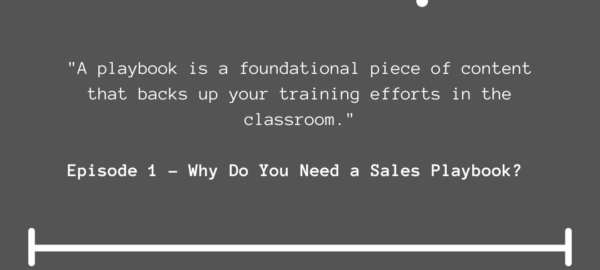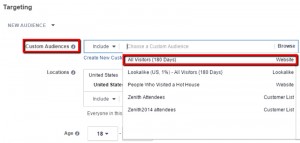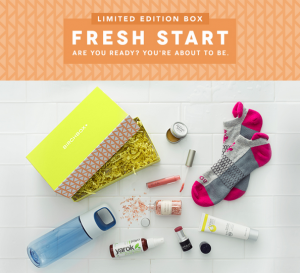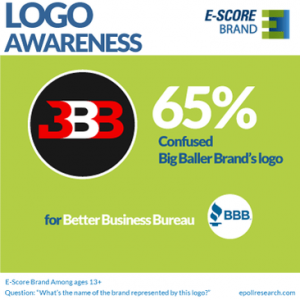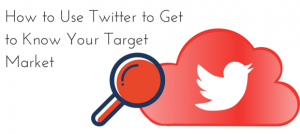In 2018, businesses spent $ 497 million on podcast advertising in 2018, and it’s estimated that by 2020, podcast ad spend will go up to a whopping $ 1 billion. So, podcasting is clearly big business.
But what about if you don’t have the money to spend on advertising on an already established podcast? Or, maybe you want to launch your own podcast to promote your business?
That’s exactly what I did this year. After many half-hearted attempts, I finally got everything together and launched The Sales Way, a podcast for B2B sales enablement leaders and Sales Managers.
For many years, I’d been an avid consumer of podcasts – across true crime, business and entrepreneurial topics. The idea of launching my own podcast promoting my sales template and content company always appealed to me, but I never got around to it. There were two reasons for that:
- I didn’t know how to launch a podcast – from recording, to editing to uploading and getting it submitted to different podcast directories.
- I didn’t have the confidence to do it – every time I recorded anything, I would delete it because I just didn’t like the sound of my voice, or I thought the content was too boring.
So what did I do? Well, I put a plan in place to fix these two things. Here’s what I did.
How do you launch a business podcast?
So, there are a few steps when it comes to launching a podcast for your business – and it all starts with thinking about your aim.
What are you trying to achieve from your podcast? Is it to build trust with customers, or to drive more awareness with new prospects? In my case, I wanted to better position myself as a leader in the sales enablement space – so in addition to my blog over at Contemsa and posting on LinkedIn, I wanted to have a few different streams of content where my audience could gain insights about sales enablement.
With that aim in mind, it was important that my podcast wasn’t about selling anything. Instead, it was about sharing insights and tips on B2B sales enablement topics such as ‘How to Involve Sales Teams in Your Sales Playbook Process’, for example. As you can see in this example episode, I’m not selling anything: I’m giving away useful tips and support for my customers and prospects.
The recording
Secondly, came the recording. I use Audacity which is a free, open-source recording program – and I record into it using a Zoom H1 mic that I got years ago for conducting customer interviews on the go. I actually do an old-fashioned way of recording, where I record directly onto the Zoom H1, then transfer the file to my laptop using the SD card. Although the Zoom H1 can be used as a USB mic straight into the laptop, I found my way to give superior sound quality.
I then use Audacity to clean up the audio, cutting out mistakes, sorting out levels and adding intros. I found videos on YouTube about the key effects you need to clean up audio intended for podcasts – but I still only do the basics of editing.
Uploading the podcast
Once you have your podcast ready to go, you need to find somewhere to host it. Although I have a WordPress website, I decided it would be too cumbersome to host all of the big audio files on there, so I use Pinecast. I uploaded my first few episodes, designed up some cover art in Canva and then Pinecast does the rest for you – it lets you submit your podcast to all the main directories such as iTunes, Google Music, and Spotify.
Really – it was so easy. I’d built up this part in my head, imagining it would be really complicated and messy, but in fact, it was the easiest bit of the process.
Promoting your podcast
The next step is to promote your podcast.
I have to admit, I didn’t have a huge launch plan. Because I was a little under-confident about finally getting my podcast out there, I decided to go for the softly softly approach with the launch. Instead, here are the steps I took:
- I created mini videos of the podcast episodes (called an Audiogram) and uploaded them to social media, with a brief overview of each episode when it launched.
- I also created full-length videos of each podcast and uploaded those to YouTube.
- For each of the podcast episodes, I created a blog post with the transcript and an embedded player for the podcast episode itself.
- I took interesting quotes from each episode and created mini graphics to share on social media
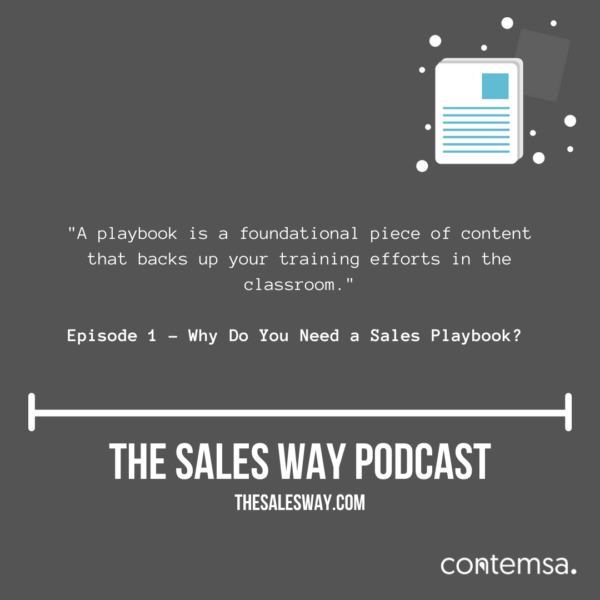
Example of one of the podcast’s social media graphics I share.
- I made sure the podcast episode titles were SEO friendly so that they could be picked up by people searching for a term, such as “Sales Enablement Podcast”.
- I wrote a press release about the launch and submitted it to a paid PR distribution site so that my launch would show up in Google news
- I interviewed three other female founders for an article on how we were all launching new digital marketing initiatives during lockdown
- Every time a podcast episode is launched, I do all the videos, mini videos, social media posts, etc – to promote it
Addressing my fears about podcasting
Despite all the technicalities of launching a podcast (and it wasn’t as technical as I thought it would be), by far the biggest hurdle was around my fears about people listening to my podcast. Which is crazy, because the whole point is that people DO listen to the podcast. There’s no point creating it if nobody listens to it, right?
I feel so comfortable writing and blogging, but the idea of recording my voice seemed like a whole other level (like video does for me currently!). But I realised it was because I wasn’t used to hearing my voice recorded, and now I’ve published a number of podcasts (7 currently, and 2 more scheduled for the next 2 weeks), I’m super comfortable with hearing my own voice recorded.
Here are a few things I did which made a big difference:
- When recording, I speak differently to how I would naturally speak – so I bring more energy to it – as if I’m delivering a presentation to a group of people. I wouldn’t talk like I was on the phone if I was delivering a presentation and the same applies when I’m doing the podcast. When I listened to early recordings where I didn’t bring that extra energy (which I deleted), I sound monotone and dull – even though it sounds completely normal to me. When I talk with more energy and brightness on the podcast, it sounds a bit over the top when I’m recording, but when I listen back to it, it sounds completely normal. So that could be worth trying if you’re struggling with hearing your own voice currently!
- I script my podcasts and adlib a bit. I now have HUGE respect for anyone who can reel off a podcast with minimal notes. I tried a few times and as soon as the record button is pressed, I close up. I’m hoping in the future I’ll be more comfortable with recording on the go.
- Read up on other people’s stories about how they overcame their fears about podcasting/video/sharing – it really shows you that in most cases, people have the same fears you do.
What I’ve learned from it all
There’s a number of things my business podcast project has taught me.
Firstly, I feel proud of what I’ve achieved. Launching a podcast has a start, middle and end, to some extent. The work is ongoing, but getting the podcast out there is an achievement – and it’s great to have some little achievements along the way in business.
Secondly, it’s opened up me up to a new world of skills and knowledge – I know a lot more than when I started; about how to edit my podcast, about the gear I need, about best recording conditions, about how to promote it. And the learning is still ongoing.
Thirdly, I feel so much more confident about public speaking now – my speaking is clearer, I sound more confident and I’m now considering how I can develop into offering webinars and video, now that I’ve found my voice.
Finally, I’ve realised I have something valuable to offer with my podcast. I’m sharing useful insights and perspectives – in bite-sized snippets about a complex topic. There’s not really another podcast like mine in this industry at the moment, so it’s good to create something different to the status quo.
—
I hope that’s inspired you to maybe give podcasting a go for your business – especially if it’s something you’ve always wanted to do, but have been a bit worried about doing. The main advice is to get out there and get your first few episodes recorded, upload them and promote them, because then there’s no going back and you can only get better. Don’t delay launching – otherwise, you might never do it!
Business & Finance Articles on Business 2 Community
(64)
